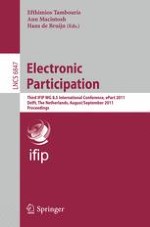2011 | Buch
Electronic Participation
Third IFIP WG 8.5 International Conference, ePart 2011, Delft, The Netherlands, August 29 – September 1, 2011. Proceedings
herausgegeben von: Efthimios Tambouris, Ann Macintosh, Hans de Bruijn
Verlag: Springer Berlin Heidelberg
Buchreihe : Lecture Notes in Computer Science
